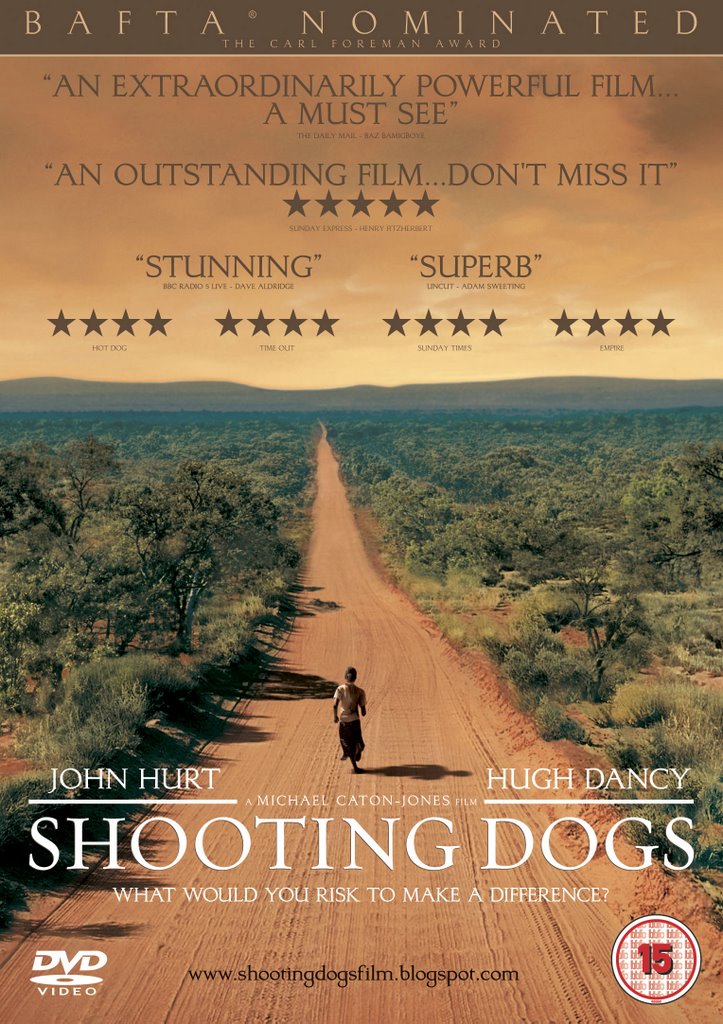Shooting Dogs

I watched the BBC Films production, Shooting Dogs a couple of nights ago with Alyssa. This was an incredibly powerful retelling of the events of the Rwandan genocide, as viewed through the eyes of an aging Catholic Priest (John Hurt) and a young, idealistic British school teacher (Hugh Dancy).
The film was shot entirely on location on the site of one of the 1994 genocide's horrific massacres - the Catholic Church run Don Bosco School on the outskirts of Kigali.
Where Hotel Rwanda was a fairly slick Hollywood production, shot on location in South Africa, Shooting Dogs is a simpler, yet far more moving and impacting look at the early days of the genocide. In fact, it leaves Hotel Rwanda in the dust as it takes a very personal look at the way the genocide unfolds before the eyes of two, Western observers.
Hurt's character, Father Christopher, has spent 30 years on the African continent yet nothing has prepared him for what he would experience as more than 2000 Tutsi and moderate Hutu men, women and children arrive at the gates of his school within hours of the start of the wholesale slaughter. The school is seen as a safe haven of sorts because it also happens to be the base for a platoon of Belgian UN Peacekeepers.
The name of the film, released in the US under the title Beyond the Gates, is a reference to a scene in the film in which the commander of the Belgian forces tells Father Christopher that his men are going to shoot the dogs which are now steadily consuming the bodies of murder victims outside the gates of the school. A few minutes earlier he had explained to the priest that his own soldiers could not fire upon the militia as they murdered the same people the dogs were now devouring. The UN soldiers "mandate" did not allow them to discharge their firearms except if they were first fired upon.
Highlighting the irony of the situation, Christopher, the priest, asks the question of the commander, "Are they shooting at you?" To which the commander replies, "What are you talking about?". Christopher spits back, "It's just, according to your mandate, if you're going to shoot the dogs, then the dogs must have been shooting at you first!".
The story explores a number of different issues directly - conflict theology, the involvement of the colonials in Africa and the lack of outside international interest in the deteriorating situation. The naivety of Dancy's character is reflected in his response to the unfolding events. The teacher launches an expedition to bring an international media presence (a BBC reporter and cameraman) to the school in the misguided belief this would be enough to avert the slaughter of the people sheltering there.
For me two things stood out the most in the movie. The first was the familiar (to me) streets and landscapes of Kigali city . To see the scenes of the genocide played out before the backdrop of a city I know well was quite an emotional experience. It brought home the reality of the Rwandan experience in a very different way to Hotel Rwanda.
The second was the deeply theological question asked of the old priest by Joe Connor, the idealistic young school teacher. It follows from a particularly harrowing scene in which a young mother and her newly born baby boy are hacked to death by machette wielding Inter'a hamwe militia.
After wittnessing the killing, Conner questions the priest about the human body's response to pain, wondering if there is a threshold beyond which pain is not felt.
Connor says, "You'de think there'd be some ahh, something in the design, you know? Some shutoff valve, if you feel enough pain." The priest answers, "I hope so." Connor replies, "yeah, God knows. Maybe we should ask him, if he's still around?".
The priests answer comes later in the movie in what is probably the most poingniant moment in the whole film.
The UN receive an order to evacuate, leaving the 2500 people they have been protecting to fend for themselves. Connor and the priest are to be among the evacuees, the last of the non-military, white personell in the school.
After boarding a truck with his belongings. Connor looks for the priest and sees him standing, smiling peacefully, in the midst of the people. bbviously not prepared to leave. Connor leaves the truck and runs to the priest, asking him what he is doing. The priest tells him that he is staying. The young teacher stumbles, trying to find the right way to tell the priest that he is unable to stay behind with him and begs him to come.
Connor asks him, "Why are you doing this?". Christopher answers softly, "You asked me Joe, 'where is God in everything that's happening here? In all this suffering?' I know exactly where he is ... he's right here, with these people, suffering. His love is here. More intense and profound than I've ever felt. And my heart is here Joe, my soul. If I leave, I think I may not find it again.".
If I were a reviewer and had given Hotel Rwanda 5 "stars", after seeing Shooting Dogs I would have to drop 2 stars from Hotel Rwanda and give this film 5.
I have only found this DVD in one video store and then only one copy. It might be something you have to ask to be ordered in for you, but the extra effort will be worth it.
The film's website (under the American title) can be viewed HERE.









No comments:
Post a Comment